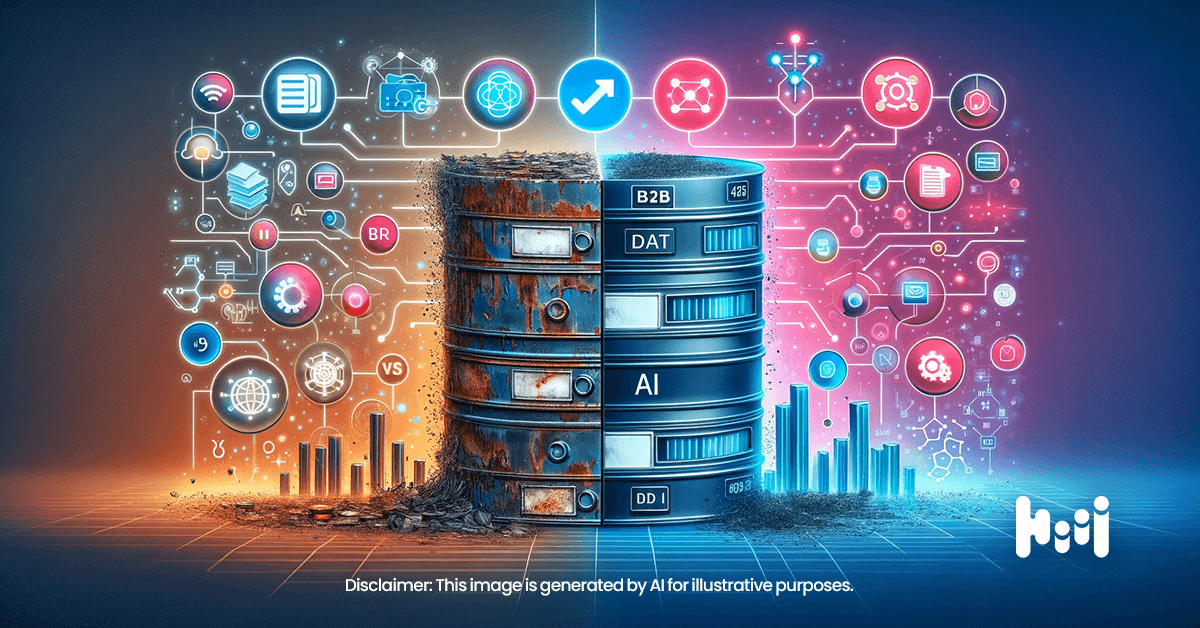
How do you get ahead quickly with prospecting and lead generation?
Ask most experts this question, and you’ll probably hear that there are no shortcuts! You’ve got to build your own database of contacts and prospects.
But…what if you could buy a way in?
By buying a B2B data list, you can cut your research phase in half and get to the pitching and selling stages faster.
So, is buying a database for marketing a smart choice? Or is it a blunder disguised as an advantage?
Once you finish reading this guide, you will know how to buy data lists smartly and strategically—without the usually assumed drawbacks.
Included in this post:
- Why You Should Buy B2B Data?
- Why You Shouldn’t Buy a Database List
- The Common Mistakes
- What to Look for When Buying Lists
Why You Should Buy B2B Data?
Effortless Source of New Prospects
No matter how many times B2B veterans say it’s a bad idea, companies are always drawn to the concept of buying database lists. Frankly, the attraction is not surprising. Buying a database for marketing is an effortless way to grow your prospects list. With the right vendor, you get a source of rich, detailed data without having to find it all on your own.
Simply put, researching everything you need to know about prospective clients involves a lot of time combing the web. Buying B2B data gets you past the research phase but still provides you with the information you need to fuel your marketing campaign. If you end up with accurate, up-to-date information, either way, there is no benefit to finding it on your own.
Ability to Purchase Curated B2B Email Lists
Ideally, you will be able to buy a B2B database in line with your target market. Many of the negative connotations about email list-buying are based on how things used to be. However, the truth is that buying databases has become a lot more sophisticated, even in just the past few years. Companies aren’t just going to sell you a jumbled list of clients, regardless of whether they fit your buyer persona or not.
Instead, a reliable B2B data provider will let you choose the list of contacts you get based on industry, firm size, geographic location, and more. This ability to purchase curated B2B email lists is perhaps the number one reason that database buying remains popular despite its negative reputation.
Why You Shouldn’t Buy a Database List: Arguments From the Experts
Under the right circumstances and with the right vendors, deciding to buy leads can save you time while giving you the same prospects you would find through your own research efforts. However, we can’t talk about B2B list buying without acknowledging some of the horror stories that businesses have weathered over the years.
Here are a few of those “archetypal” horror tales, as well as why they sometimes play out the way they do:
1. Spammer’s Bane
A company buys an email list from a data vendor and immediately starts shooting out form emails to the contacts. Each email is crafted the same way and quickly starts pushing the product or service that the company has to offer. Not only do the recipients decide not to respond, but they mark the emails as spam. Eventually, email filters start flagging the B2B company’s email address as a source of spam, which means that most of the company’s emails never reach their destination.
What went wrong?
There are a few mistakes here. Firstly, if you do decide to buy a database list, that’s no excuse to skip all the work. You don’t need to research email addresses or contacts, but you do need to think about the database information critically to determine the best strategy for contacting the prospect. Think about demographics, firmographics, technographics, customer bases, and pain points. Much of this information is there in the database list. Other tidbits you will need to find on your own. With the right information, you can approach each contact with a personalized introduction or pitch. This ABM-like approach is a lot more likely to result in a receptive client.
Secondly, if there’s any chance that other B2B marketers have bought the same contact list, you will need to work twice as hard to avoid the spam button. Part of the reason that buying databases has such a flawed reputation is that bad data vendors sell the same list many times over. Contacts on those lists, therefore, end up inundated with emails they don’t want from businesses that are not reputable. Months or years of receiving junk email would make anyone more predisposed to mark messages from unknown senders as spam.
2. Out of Date and Useless
A company buys a B2B marketing database, hoping to inject its current contact list with some new growth and vibrancy. This time, the marketers do the right thing. They research their targets, try to learn about the needs of each prospect, and craft emails that (hopefully) won’t be met with hostility. Despite all that effort, half the emails are undeliverable and another 40% are unanswered. Of the hundreds of contacts the B2B marketing company bought, they get responses from less than 10 of them and only close deals with one or two.
What went wrong?
Substandard data vendors sell out-of-date and inaccurate data lists. This fact is something you must be aware of when shopping for contact lists. Contacts and decision-makers at big companies are always being promoted or taking new jobs. These frequent moves mean that even useful databases don’t stay accurate for very long. A reliable data vendor will track the changes and make sure you get information that is current.
3. A Picked-Over Market
A company buys a data list of contacts that fit squarely into its industry and buyer persona. Unfortunately, when the marketers start sending pitches, they learn that they had already pitched to most of the prospects. As a result, many of the prospects aren’t prospects at all, because they’ve recently bought products or services in the same market niche.
What went wrong?
If you are considering buying a database for marketing, you have to assume that your competitors are doing the same. In this case, the company probably bought a data list from a vendor that sold the same list to several other companies. As such, the prospects were picked over and weren’t worth a whole lot. Sure, there is a chance these same contacts could be worth something in a few years when those companies are ready to buy again. No B2B marketer buys a contact list to use in two years, though. You buy a B2B marketing database to use immediately.
To avoid paying cash for spent leads, look for a data vendor that lets you build a contact profile with industry, demographic, and technographic information. The more advanced you can get with your profile selection, the more unique your contact list will be.
The Common Mistakes of Buying Data Lists
Because of stories like the ones above, experts often recommend NOT buying B2B data lists. Indeed, these stories show that buying a marketing database will not always go the way you expect. However, as we’ve already touched upon, the companies in the stories above made some pretty glaring mistakes when purchasing their data lists.
Ultimately, most data list horror stories come down to two different mistakes.
The first is not knowing anything about who you are contacting. This blunder was the fatal flaw of the B2B marketing company in the first scenario. It is tempting when you buy a database just to shoot out emails to anyone on the list. Mainly if you view buying leads as a “shortcut” or “head start,” you might try this method.
However, before you send an email, think about how the “contact now” impulse runs contrary to every best practice you’ve learned in the B2B industry. This impulse is impossible to act upon when you build your own lists from scratch, which is why experts prefer that method. When you do your homework to find contact and lead info, you naturally learn vital facts about potential clients. You can then use this information to execute ABM—even with new contacts.
Even if you buy a database, take some time to research each contact and build a client profile. When you show that you know something about a prospect, they are more likely to respond positively to your email.
The second common blunder of buying contact lists is failing to vet the data vendor. Your database is only going to be as good as the company that sold it to you. So, don’t just buy a list and assume you will get high-quality data. Instead, take the time to research the company you are buying from and vet them thoroughly. Not all data vendors are created equal, and doing a bit of research will help you tell the bad ones from the good.
What to Look for When Buying Lists
Many “experts” are going to tell you that buying B2B lists is industry suicide. In reality, though, buying email lists is not, by itself, the problem. Instead, the problem is buying deficient lists from inferior vendors. Finding a quality vendor will unlock the benefits of buying B2B data lists without exposing you to the cons or risks.
Follow these steps to find the perfect list
1. Pick a Reputable Company
Simply put, some data vendors have a reputation for being “shady.” The good news is that companies with bad reputations have nowhere to hide in the age of the internet. You can spot a superior data vendor by looking for indications of their reputation. These indicators may include well-designed company websites, transparent and easy-to-find contact information, and current online reviews.
Also, look for companies that offer free trials of their data list services. These vendors believe enough in what they provide to let you try it for free. They are confident that you will want to buy after you try, which is an extremely positive sign. Plus, if you test the free trial and have a negative experience, you have no obligation to buy a database list from the company. You can ride the free trial to the end and then head back to the drawing board to find a different data vendor.
2. Choose a Good Database
Just because a data vendor looks reputable doesn’t always mean that they have the contact lists you want. Even after you find the “right” vendor, you still need to do some legwork to get your hands on a valuable database.
Here are a few strategies to help you get the right list:
- Do not buy from a company that sells “one size fits all” lists. In the world of B2B marketing, “one size fits all” is a concept that doesn’t exist. Every company has a different industry, marketing niche, and buyer persona. A good data vendor will let you build custom contact lists based on your needs (instead of trying to sell you a pre-existing list).
- Buy a list that you get to customize yourself—at least in part. The best data vendors will give you smart profile selection options that let you zero in on the right contacts using firmographic, demographic, technographic, and geographic information.
- Ask your vendor how often the lists they sell are updated. Ideally, you will find a data vendor that tracks and updates contacts consistently—not one that sells old, dead lists. Making sure you purchase an up-to-the-minute list will save you from hours or days drafting emails that are just going to bounce the minute you click “Send.”
At DemandScience, we are proud to be the rare B2B data vendor that meets each of the expectations listed above. With sophisticated profile selection options, geographic targeting capabilities that span 90 countries, detailed firmographic and technographic data, and smart and live data that tracks and updates contacts as they move roles, our software is the B2B data source you have been seeking. Interested? Get in touch today!
Sources:
- https://www.linkedin.com/pulse/what-pros-cons-buying-email-list-steven-boehle/
- https://website-designs.com/online-marketing/the-pros-and-cons-of-buying-email-mailing-lists/
- https://firedupdigital.com/email-marketing-list/
- https://blog.hubspot.com/blog/tabid/6307/bid/32892/why-purchasing-email-lists-is-always-a-bad-idea.aspx










